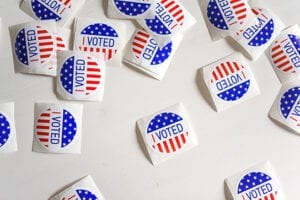As our attention turns to the upcoming presidential election on November 3, 2020, the Sisters of Charity of Saint Elizabeth, in Convent Station, N.J., asked their Office of Peace, Justice, and Ecological Integrity to prepare reflections that will help to discern and form our consciences during this electoral season. Each week they will share a quote from the United States Conference of Catholic Bishops Forming Consciences for Faithful Citizenship: A Call to Political Responsibility from the Catholic Bishops of the United States, some questions for reflection, and a link to further material to those who would like to take a “deeper dive” into the issues the bishops raise. The Sisters of Charity of New York are grateful to be able to share the reflections created by Father Terrence Moran.
From Forming Consciences for Faithful Citizenship, # 14.
Unfortunately, politics in our country often can be a contest of powerful interests, partisan attacks, sound bites, and media hype. The Church calls for a different kind of political engagement: one shaped by the moral convictions of well-formed  consciences and focused on the dignity of every human being, the pursuit of the common good, and the protection of the weak and the vulnerable. As Pope Francis reminds us, “Politics, though often denigrated, remains a lofty vocation and one of the highest forms of charity, inasmuch as it seeks the common good. . . . I beg the Lord to grant us more politicians who are genuinely disturbed by the state of society, the people, the lives of the poor!” (Evangelii Gaudium, no. 205). The Catholic call to faithful citizenship affirms the importance of political participation and insists that public service is a worthy vocation. As citizens, we should be guided more by our moral convictions than by our attachment to a political party or interest group. When necessary, our participation should help transform the party to which we belong; we should not let the party transform us in such a way that we neglect or deny fundamental moral truths or approve intrinsically evil acts. We are called to bring together our principles and our political choices, our values and our votes, to help build a civilization of truth and love.
consciences and focused on the dignity of every human being, the pursuit of the common good, and the protection of the weak and the vulnerable. As Pope Francis reminds us, “Politics, though often denigrated, remains a lofty vocation and one of the highest forms of charity, inasmuch as it seeks the common good. . . . I beg the Lord to grant us more politicians who are genuinely disturbed by the state of society, the people, the lives of the poor!” (Evangelii Gaudium, no. 205). The Catholic call to faithful citizenship affirms the importance of political participation and insists that public service is a worthy vocation. As citizens, we should be guided more by our moral convictions than by our attachment to a political party or interest group. When necessary, our participation should help transform the party to which we belong; we should not let the party transform us in such a way that we neglect or deny fundamental moral truths or approve intrinsically evil acts. We are called to bring together our principles and our political choices, our values and our votes, to help build a civilization of truth and love.
Reflection:
- We often hear countdowns to Election Day – 19 days to November 3, 2020. But we are really already at Election Day. In this unprecedented Election Year, due to the COVID-19 pandemic, an estimated 10 million people have already voted. You may have already completed your process of discernment and voted yourself. Similarly, because of the unusually large number of mail in ballots, election night may very likely not provide final results. Resolve not to be caught up in media hype. It’s more important to have full and complete results than fast results.
- Because of the unprecedented nature of this electoral cycle, many people are confused about the practicalities of voting, especially senior citizens, people with poor access to the internet, people with inadequate access to transportation. Resolve to have a conversation with as many people as you can about their plans for voting. Can you offer assistance in filling out a mail in ballot? with a ride to a polling place or drop box for a ballot? If you have questions yourself and for information to help other people with their questions, check out the resources of the League of Women Voters.
- Plan to spend some time in contemplative reflection every day in the time remaining before election day. Uncertainty promotes anxiety and fear and none of us is at our best when we think, speak, or act out of fear. The great Jesuit peace activist Fr. Daniel Berrigan wrote, “Beneath all our stupidities, is the heart of God, scheming.” Do whatever helps you to get beneath what the bishops’ document calls, “a contest of powerful interests, partisan attacks, sound bites, and media hype” and to drop deep into the heart of God.
- Call to mind members of your family, friends, work colleagues, fellow parishioners, people with whom you are likely to discuss the news or have political conversations in the coming weeks. What attitudes of mind and heart do I need to develop to relate to each of them in a way that is true to my deepest values? To my commitment to build a civilization of truth and love?
Deeper Dive:
Listen to this talk by Sister of Charity of Saint Elizabeth Peggy O’Neill at the 2013 Ignatian Family Teach-In for Justice
How can Peggy’s experience of being a person and a teacher of peace in a situation of violence inspire us?
Prayer:
A Corporal Works of Mercy Voting Lens
- For I was hungry and you gave me food. How does this legislation/legislator provide for those who need food assistance?
- I was thirsty and you gave me drink. How does this legislation/legislator provide for safe drinking water and holds those businesses accountable for the contamination of water supplies?
- A stranger and you welcomed me. How does this legislation/legislator stand on just and comprehensive Immigration Reform?
- Naked and you clothed me. Where does this legislation/legislator stand on welfare assistance for those who are truly in need and supports an increase in minimum wage?
- Ill and you cared for me. Does this legislation/legislator support affordable health care?
- In prison and you visited me. Where does this legislation/legislator stand on prison reform and on the death penalty?
Adapted from A Voting Lens Prayer by Diane Smith, CSJ
Courtesy of the Sisters of Charity of Saint Elizabeth, Convent Station, N.J.
